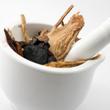
The adaptogens product market has been booming since the COVID-19 pandemic. As consumers are increasingly focused on general health and well-being, it’s important to understand what these products are and how to best counsel patients on their safe use.
The word adaptogen comes from the Latin word "adaptare", meaning to adjust or fit, and the Greek word "gen", meaning produced by or generated by. Adaptogens are believed to stimulate or generate the body’s ability to resist physical, environmental, and emotional stressors. Although many plants are traditionally referred to as adaptogens, only some plants have demonstrated these effects in clinical research.
Ashwagandha is by far the most popular adaptogen today – it’s been among the top selling herbal supplements for several years. There’s growing evidence supporting its use for anxiety, insomnia, and stress. American ginseng, astragalus, cordyceps, and Panax ginseng are also widely used adaptogens. Supportive clinical evidence on these ingredients varies. There’s some evidence supporting the use of American ginseng for upper airway infections and Panax ginseng for cognitive function. But it’s not clear if astragalus or cordyceps are helpful for any condition.
As for safety, it’s important to review the data for each adaptogen individually. Many adaptogens have been used safely on a short-term basis. For example, ashwagandha has been used safely in doses of up to 1250 mg daily for up to 6 months. But Panax ginseng shouldn’t be used for longer than 6 months – it has potential hormone-like effects that may be harmful long-term.
The biggest concern for adaptogen products is quality – adulteration and false advertising claims remain ongoing problems. Talk to patients about the evidence to help combat false marketing claims and help manage expectations about their effects. Lastly, remind patients that not all product seals and quality certifications are equal. Encourage patients to review product certifications carefully before purchasing and to be cautious of consumer ratings and best-seller banners online.
Review our adaptogens monographs for more details on individual ingredients.
The information in this brief report is intended for informational purposes only, and is meant to help users better understand health concerns. This information should not be interpreted as specific medical advice. Users should consult with a qualified healthcare provider for specific questions regarding therapies, diagnosis and/or health conditions, prior to making therapeutic decisions. Copyright © 2025 NatMed. Commercial distribution or reproduction prohibited. NatMed is the leading provider of high-quality, evidence-based, clinically-relevant information on natural medicine, dietary supplements, herbs, vitamins, minerals, functional foods, diets, complementary practices, CAM modalities, exercises and medical conditions. Monograph sections include interactions with herbs, drugs, foods and labs, contraindications, depletions, dosing, toxicology, adverse effects, pregnancy and lactation data, synonyms, safety and effectiveness.
